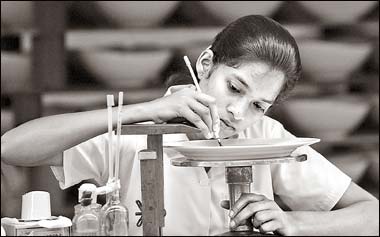Drawing a fair line
Why is gender equality slow-paced in Sri Lanka?
DR MATHU H LIYANAGE
Education is a tool of empowerment for women coming from a rural
and less privileged background as it helps rectify wage and income
imbalances when they are engaged in employment which are dominated by
their male counterparts
Social justice poses problems for women working in the city where
both husband and wife are employed, in the absence of well-run and
affordable childcare centres to look after the children while they are
at work.
|

Making an equal contribution to the economy. AFP |
It also calls for husbandís participation in sharing of household
work necessarily involving a change of role of men. The absence of
mandatory paid maternal and paternal leave, to be taken alternatively at
childbirth, as in most developed countries, will intensify the
complexity of the problem.
In suburban and rural areas, this problem may be mitigated to a great
extent by the assistance of members of extended families, a system that
is fast eroding. Gender equality is incomplete if it does not address
the economic issues involved - the other side of the coin.
In developing countries such as Sri Lanka, average women obtain lower
levels of education than men resulting in less productivity and income
than their male counterparts.
Education
This has been partly solved by the free education system, the
establishment of Central Schools and Universities in most districts to
bring education within the reach of those living in urban, suburban
areas and rural villages, narrowing the gap in education and employment
opportunities between the rich and the poor and men and women.
While the gender factor restricts womenís access to employment and
resources, it certainly creates economic inefficiencies.
The gender wage gap implies an inefficient allocation of labour and
skewed investment in human capital which is detriment to women.
Most of these inequalities are stemming from historical, cultural and
traditional societal mores.
It is evident that trade expansion in recent years has increased job
opportunities for women mainly in clothing and garment industries and in
ceramics.
In 2008, the textile industry earned $3.5 billion and found
employment for 250,000 persons, mainly young women from rural areas.
The other significant source was the employment of women in the
Middle East and a few other countries as housemaids or domestic aides.
Contribution to economy
The number of women so employed in 1996 was 110,479, which increased
to 125, 493 in 2005 with a slight decrease in 2007 that accounted for
102,176, according to the Sri Lanka Foreign Employment Bureau.
The remittances from Middle East countries in 1996 were Rs 26,728
million that increased to Rs 160,502 million in 2007 (provisional).
This has resulted in women having greater access to income and has
changed their position in the society, raising their status, winning
greater independence and gaining more control over household resources
and management.
Narrowing wage gap
It is possible that an increase in unskilled labour-intensive exports
such as clothing, garment industries and ceramics may tend to increase
the demand for lower-skilled labour, narrowing the gender wage gap as
the demand tends to increase the wages of unskilled workers, provided
the supply remains constant, relative to the wages of the skilled since
women are employed in lower- skilled and lower- paid jobs than men.
In the long run, it may be possible for export-oriented firms to
adopt cost-cutting techniques by the use of wage differential as a tool.
The bargaining power of skilled workers will rise while unskilled
workers may not, resulting in loss of jobs and widening the gender and
wage gap.
To avert such a situation, it is the Government duty to set up
technical colleges and launch trade apprentice schemes across the
country to train both men and women in various trades to fit into the
more competitive, integrated global economy. |



